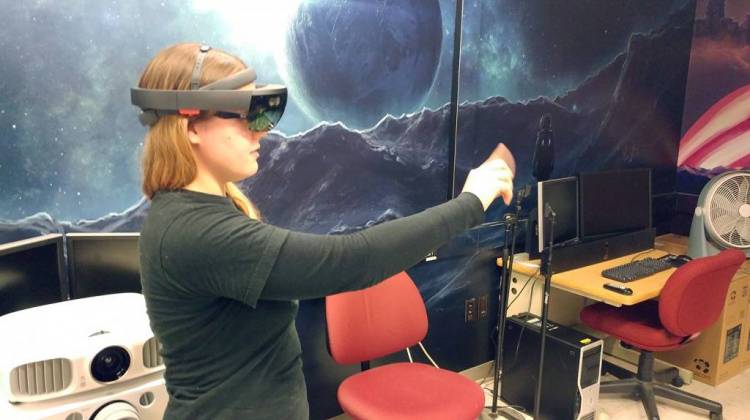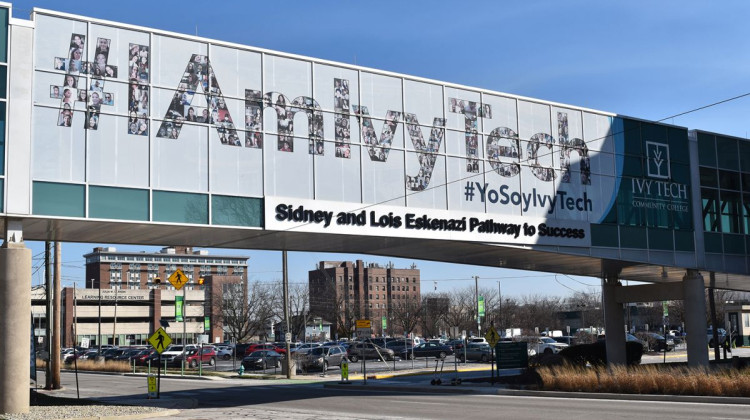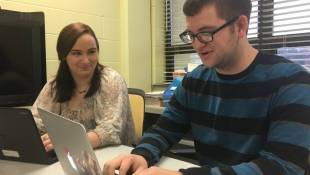
One of every two computer science students at Indiana colleges will leave the state after graduation, according to a recent study.
IPBS-RJCOne of every two computer science students at Indiana colleges will leave the state after graduation, according to a recent study.
It has schools such as Purdue University trying new ways to reverse that economic loss, by investing in trendy fields where students want to work – such as virtual reality, or VR.
It’s the next big thing in the video game industry, which is now worth more than the film industry.
Purdue associate professor Dave Whittinghill says its applications go beyond gaming, to education, and training.
“It’s a difference of reading a book about going on a date and holding somebody’s hand – you’re nervous and all that kind of stuff, versus going on a date and holding somebody’s hand,” he says. “You will remember these things differently, and that’s what happens in VR, is you’re processing that information differently.”
Whittinghill runs Purdue’s Games Innovation Lab, complete with fantastical murals, high-tech equipment, a comfy couch and big flat-screen. Purdue is investing in this program and enrolling more game design students than ever.
The major’s pretty new, but already comprises half the Computer Graphics Technology department. Whittinghill hopes this lab will inspire more of those students to stick around.
“We think we can have an economic impact here in the Midwest, because everything is so pushed to the coasts – mostly California and Vancouver, but also New York City – but there’s just not much in the Midwest,” he says. “And with the market getting so big… Why not do it here?”
And Whittinghill walks the walk. He started his own company through Purdue’s business incubator. It’s called Virtualis, and its first invention was the virtual nose to help treat VR motion sickness.
VR can make you sick because your brain thinks you’re moving when your body isn’t. The nose would be programmed into the simulation as a fixed point, barely visible between the eyes, to ease some of that confusion.
It got Virtualis a lot of attention when it premiered, and now, Whittinghill is hoping to grow his company – he could even hire some of his students, like seniors Jordyn Lukomski and Amanda Luginbuhl.
They want to be video game artists, but right now they work creating educational simulations for Purdue.
“We created an application that mimics a grasshopper dissection,” Luginbuhl says. “Our sponsor is a head professor in the entomology department here at Purdue.”

Professor Christian Osetu says the dissection simulation is a great alternative to an exercise that goes against some students’ cultures and is generally a lot grosser than you might think.
“Some of the kids don’t mind it; other kids really do mind it, and so they’ll put on gloves and forceps and try to get as far away from that dissection as possible,” he says. “But with this system, you get rid of all of that.”
Plus, you can mess up and start over with ease. The simulation uses an augmented reality headset to superimpose floating images of grasshopper parts and dissection tools on the user’s real environment.
Jordyn Lukomski says this kind of application is attracting more students like her to the field.
“I think people come into this thinking they just want to create games and entertainment games,” she says. “But even then you get into the idea of serious games, or games that teach certain aspects like math or even just moral values. And I think the more they’re exposed to that, the more they’re interested [in] it.”
She and Amanda Luginbuhl will keep doing it in Indiana – at least for now. After graduation, they plan to get master’s degrees in computer graphics at Purdue.
 DONATE
DONATE





 View More Articles
View More Articles


 Support WFYI. We can't do it without you.
Support WFYI. We can't do it without you.